It’s Sunday night in Park Slope, Brooklyn. The air is crisp, and the sun has yet to set. Gathered outside of an apartment building on 15th Street stands a smattering of singles, ranging in age, sexuality, and gender. Some have been waiting for 30 minutes; others have just arrived, breathless and deeply late (me). Several are friends from college, a few are exes, many are strangers. All are there for the same reason: to meet a Friend-of-a-Friend.
I’ve been intrigued by the influx of “singles meet-ups” seemingly taking the world by storm for a while now. In New York alone, there’s a run/dating club, a dinner party series, a party party series, and of course, a plethora of pickleball leagues. So, when I was sent an invite for “Friend-of-a-Friend: A singles mixer for monogamous, straight, or queer New Yorkers trying to get off the apps and meet people the old-fashioned way,” I obviously signed up.
Not only could it be fun, but the activity fit perfectly into #18. “Tell Your Friends You’re Interested in Getting Married.”
The night after the event, I hopped on Zoom with FOF's organizers: Zoe Black and Sydney Watt. Together, we took a deep dive into the event's intention, dissected the rise of singles mixers, and unpacked dirty details from the evening.
I began with a simple question: how did Friend-of-a-Friend come to be?
*This interview has been condensed for clarity. For full conversation, listen to the audio!*
Zoe: I feel like we've been complaining about dating as most people have, talking about the apps and how transient and not very full of connection they can be, and thinking about different ways of meeting people. And then I can't remember how we were talking about a mixer of some nature, like an in-person event.
Sydney: We were checking out this new bar in my neighborhood, Corto, and they just had their opening or their soft opening, so we were hanging out there and you said “I have some friends who have a backyard space and we've thought about doing a singles mixer there,” and then you asked me if I was interested in doing it and I was like yeah in fact I want to be on the committee.
Emily: It sounds like a cool Avengers assemble moment: everyone had a unique component that made this work, right? Maddie and Hannah had the backyard, Sydney the event planning experience, Zoe the advertising and organizational. Who did the graphic, by the way?
Zoe: Rachel [Forcillo].
Sydney: She was our graphic designer for the event. And Zoe was our Comms Director. And I was Experiential Director. I've actually over the past year been obsessively reading about singles mixers, how they're organized, and problems a lot of them run into. So when we were putting this one together, we started off being like, who's the event for?
We decided that the event primarily is for women, even though there are people of all genders who are there. It's for women and for people whom women want to date. And something that I noticed just through my reading was that a lot of these events have issues where not enough guys sign up, a lot of the guys flake. It becomes a sort of competitive atmosphere, I already feel like the dating scene in New York can be competitive for a lot of women in that just the dating economics of it — it feels like there's an imbalance of numbers.
So that was a big thing we were thinking about when we were planning it: How do we want to curate the people? What are the sort of ratios we want? What are the built-in narratives of living and dating in New York? Namely, that there aren't enough single men to go around for all the women that we want to overturn. And that guided a lot of our decisions for how to ultimately structure the event.
Emily: One of the things that was so amazing about it was it didn't feel competitive, and it didn't even feel like there was pressure. Even if you go to a bar and suddenly you see someone across the bar, and you meet and talk for five minutes, there's this insane pressure of “I have to make this work, I have to get them to like me,” otherwise it's not a story.
And the way it was curated, it wasn't for one preference only… it was a choose your own adventure depending on what you're looking for and who you're looking for. And that made it feel really democratic and supportive.
Zoe: To your point about the pressure-filled scenarios that we find ourselves in with dating, so much of dating in New York is going on one to three dates and then making a call right then of just “this is my person or this isn't my person” and that's it and that's how I'm going to live my life.
Whereas I feel like this event had a lot of chances to meet everyone. You're not basing it on one conversation. You're saying yes or no. We gave everyone's contact information. We were like, go be friends, go hang out, whatever type of relationship you want to have with people like that.
Sydney: Zoe I feel like some of this also pulled from, whether intentionally or unintentionally, our conversations about dating. We come from somewhat different perspectives in that you're queer, I'm straight, and I feel like talking to you about dating, there's much more of a dynamic built into the queerness.
From what you've told me, there is some more fluidity in what a relationship is going to be that I have not experienced as much in my personal dating life. I think that was also some of the energy that you were speaking to of what we were trying to bring to this event.
Zoe: I also tend to talk about these things from my own very narrow perspective of dating. So let me know if also anything is like, oh, that's just your specific experience, but I think that is something that we tried to bring to this event.
Emily: One of the things I love and hate about dating is the universality. Obviously, there are different experiences based on who you're dating and what you're looking for, but at the core of it is you often feel like you have to make this decision of, is this person gonna be my person?
And if not, what am I doing? And the difference often in queer relationships versus straight relationships, I think — I'm not going to make a large generalization — sometimes the lines are more blurred. You could go on a couple of dates with someone and be like, we're going to be friends, but I don't want to date you.
Whereas with straight relationships, more often than not, it's like you go on one or two dates, you're not feeling it. You never see that person again.
Sydney: I think it's challenged for me, maybe how I should approach things with men, because it's not that I need a million new straight male friends, but I don't know. It's definitely our conversation, Zoe, that made me rethink how I'm participating in dating in the early stages.
Zoe: People I’ve gone on dates with, and it didn't really work, but they were like good enough terms for me to be like, “Hey, would you want to come to this event and potentially meet other people?”
And they were like, absolutely. You were really cool. And I trust your judgment.
Emily: It was funny when I came and was waiting outside, I ran into a friend who was with their ex, and they were like, we dated for a year.
Zoe: Wait, did they come individually? They were both individually invited?
Emily: Yep.
Zoe: Shut up.
Emily: They are now friends, and they were a queer couple. It was very emblematic of that thing we just talked about, which is that they were both like, I don't love that my ex is here. But at the same time, they were fine with it because they were like, I think this person rocks and I'm still friends with them even though we did date for a significant amount of time.
Zoe: Friend-of-a-friend gets messy.
Emily: That's a tiny tangent, but then walking in, in the hallway, the barrier was broken almost immediately. We were in a group of five. I was with the two exes I knew, and then these two guys, and we were standing outside of the door at the end of the hallway where this apartment is, and everyone just looked at each other like, do we go in? Does it open for us? What happens?
And to the point of dating, I think something that people often get into is not a rhythm, but rather you sleepwalk through the first few stages. You're like, okay, I gotta get through dates one through three. I gotta see if I like this person. This [event] was completely unexpected, and there was an element of excitement and surprise that made it fun.
Sydney: I love hearing all of this because this is the first of these we've put on and so much of it is trial and error.
You're not privy to what's going on inside, and we're not privy to what's going on outside, and we're inside like, oh my god, we gotta get people through this line faster. It's taking so long. It's a lovely reframe for my mind to be like, oh no; sometimes things are accidental and they actually aid the experience.

Zoe: Something that we didn't do in the beginning was once everyone was checked in was to make them form smaller groups and randomly move people around so that they talk to different people. But I think what happened with the outside and the small groups in the hallway kind of did what we were trying to do, which is break people up semi-randomly, give a reason to interact, and get them out of their shell.
Sydney: We thought the waiting outside was going to be such a con to the entire experience.
Zoe: But it brought everyone together.
Emily: I think the other reason this sort of event is lovely and fun and why there is this explosion of singles events right now is that we have an oversaturation of choice and too much control.
It's great that all the power is in your hand, if you really want to go on a date, you can download an app and swipe and find it, but it's so much choice and it's so much control. And I'm not saying that I want to be matchmade by the local Yenta, but it's nice to just give yourself over to a system for a night.
I think a lot of people went into this event wondering how planned out it was going to be and hoping that there would be that sense of structure so that we could talk to each other but we weren't wandering around blindly.
Sydney: It felt like putting on a show on opening night, but because it's an event that only happens once, opening night is your dress rehearsal. And so there was a lot of improvisation. We thought that we were going to do intros with every person going around saying their name, pronouns, a fun fact about them, and who they were interested in dating. Then we realized that after it took so long to get people in, that would have been another hour and then the event would have been three-quarters of the way done.
Emily: For those who weren't there, there were about 60 people, right?
Zoe: 53 total people and seven volunteers.
Emily: It was packed in a good way, in this backyard in Brooklyn. A cocktail bar in one area with amazing cocktails. 60 Brooklynites and our hosts…
Zoe: There was a beautiful garden, tiki torches, and lights around. It was very sweet and romantic and not too hot.
It was actually the perfect day to do it. But what I wanted to mention on top of what Sydney was saying is that not only were we improvising the whole time, I think we had the perfect group of people to be able to do that because everyone was just like, all right. Sounds good. Okay, cool. We'll do this. Everyone was in a mindset of yeah, and we're going to get it done.
Emily: To use the theater metaphor: I'm sure it ran like the first and last night of a massive interactive show where you can't see the cast, the director, the stage manager is sweating and probably has cried eight times but it doesn’t matter because the show is running and the audience is stoked to be there.
This event was like seeing live theater, whereas going on a dating app is watching TV. There was so much that could go wrong.
Zoe: So much vulnerability.
Emily: There's an audience and you don't know, the mixing of people could have been the worst vibe ever. People might not have been down. They might not have played along. A TV show doesn't matter; they're watching it in their sweatpants, eating a pint of ice cream.
Something I loved were the wing women and the slips of paper, which were used as a conversation starter. But before we get to the wing women, we all had these ribbons. Let’s clarify what the ribbons were for, because that was a very smart way to signify what you're looking for and who you're looking for.
Sydney: We knew that we wanted to have a visual signifier for who was interested in who. We originally were thinking of corsages because of a garden party, but we're working on a shoestring budget here, so we pivoted to ribbons.
We had green ribbons for anyone who was interested exclusively in women and or nonbinary people. We had purple ribbons for women who were exclusively interested in men. Who am I missing? Oh, we had blue ribbons for people who are interested in everyone.
Emily: And then white was for the hosts and the wing women.
So the wing women, they're walking around with slips of paper. And you're in the middle of a conversation with people of all different color ribbons, and then someone hands you a slip of paper, and they're like, can you please go to someone else you haven't talked to tonight and use this prompt?
My prompt was: do you consider yourself vanilla or kinky? Which started A LOT of conversations.
When you came up with the prompts, how did that work? And what was the thought behind it?
Zoe: I'm trying to remember how the wing women came about. We had a list of things that could not go wrong, but things that we might have to address.
If someone is feeling particularly shy or if there's a friend group that won't get away from each other and we're like, okay, here are a couple of things that we might need to address throughout the night. How do we do that? That was a big reason: how do we make sure everyone's included and everyone's talking to everybody?
We thought that people would be in that mindset of, "I'm here to meet people and actually talk to them and not just talk about surface-level things.” So we gave them AN opportunity to do that. Also, shout out to our wingwomen Aubrey and Claire.

By the end of the night, everyone had a slip of paper. I'm like, oh my gosh, everyone's been moved around and strategically placed. They did such a good job.
Sydney: When we were designing the event, we were trying to decide how formal or informal it was going to be. You think of a typical speed dating event, for example, and it's super formalized. You're probably talking to a new person every three minutes. It's one on one. I've only ever been to one singles event; it was right before COVID shutdowns and it was not structured at all. It was perfectly lovely, but it was difficult to have conversations with new people.
So we were trying to figure out a way to straddle that line of not making it feel, like nerdy, but also not like everyone had to fend for themselves.
Zoe: As someone who has not done the amount of research that Sydney has done or been to as many events, I'm so curious about how this stacks up compared to other events and what the pros and cons of all of these different event types are.
Sydney: This thought is coming to my mind as we're discussing, is these two almost contradictory issues with dating on dating apps, and these aren't new ideas, but I haven't thought of them together before.
Often you find that you maybe only need a very little amount of time to know if you have any interest in someone. It's a little amount of time in person, that is, but at the same time, with apps, I think that we become so desensitized to what we might find attractive if we were to give it the chance that sometimes we're not even matching with someone to realize if we are or are not into them in the first three minutes of meeting them.
It's like contradictory tensions that I think are part of the reason why people get really burnt out on the apps.
Emily: A hundred percent. I think it doesn't make sense. And I guess that's the point of dating. It's both sides where you want to give people a chance, You want to see past your first impression, but at the same time, sometimes your first impression is very right.
I think about this all the time; I guess this is just the crazy craziness that is life. When you think about it in the sense of a dating app, it's whittled down more. But how wild the person you end up with, it's a matter of in real life, you either talked to them in the vegetable aisle at the grocery store, or you didn't, or you either accidentally swiped one way and didn't even mean to. It's so much chance.
Sydney: I've probably read every article that has been written about dating. But there's been a huge flux of them recently and I know the Atlantic did an article about meet-cutes and traditionally meeting people as opposed to off the apps. A point that they made that I had not thought about previously was that you didn't as often just meet someone at a grocery store, you didn't as often just chat up a stranger at a coffee shop.
Of course, that's how some people met, but it was way more often via people in your network. There was more of a culture of setting people up than there is now. I think the apps have made it so convenient to have your dating life and your social life separate until you’re basically in a relationship with someone.
I've certainly met friends’ partners many times only after they've made it official. And that shift in culture over the last ten years or so since apps really got destigmatized has led to people being a lot antsier about introducing people we know… is it going to be awkward if I introduce this friend to this friend and then they break up? We just don't have that muscle anymore.
It's been outsourced almost entirely to technology. Which, I don't know, it's just anti-community as well, and it's depressing. Yeah.
Emily: But also it's hopeful. The actual prompt I'm using for this 129 item is “Tell Your Friends You’re Interested In Getting Married.” And certainly, I don't think everyone at the event was interested in getting married, but taking a page from 1958, the idea was the active practice of making sure your friends knew that you are looking for something serious and long-term and you want them to be looking for you in their circle. And what you both [Zoe and Sydney] did was that. People's friends sent them to this event because they knew they were looking for something. And they were like, go to this. Create a community.
Zoe: It was like a specific subset of people who, yeah, are very intentional.
And we got a lot of, honestly, when I would ask people, they would say, “Oh, I know someone. Oh wait no, they're a mess right now.”
Or, we got people who other people thought were not only interested in a relationship but also they approved of them being in a relationship. It was almost like therapist-approved people. I actually told my therapist about this, and she was like, huh, I've got a couple of people that might benefit from.
Sydney: So Emily, we, Zoe and I, were harassing people to sign up or to sign their friends up or to share it with their network.
I reached out to some people whom I haven't seen in a decade or people who didn't even live in New York, but I knew they had big networks in New York. We were putting in a lot of time and work to get people to actually sign up for the event and not just the same five, ten, fifteen people we see most regularly.
And I think having us as the middlemen, not even asking directly, “Is there someone you know who you think would be good with me,” but asking, “Is there someone you know who you think would be good with anyone?” It broadens the landscape of who could come, and I would guess took a lot of the pressure off of the people who are volunteering their friends because they knew it's out of their hands who this person at this party is going to really connect with.
Emily: I've been thinking about what made this whole event unique, too. Granted, I haven't been to anything else, but while you've been reading, I've been deep in TikTok watching, which isn't the same thing, but it's the live version of “I read an article.” What made this event so special was that it felt like there was a certain level of care that went into it. It was really intentional.
People put forward the people they care about. Thinking about the bigger events that we're seeing everywhere, I mentioned there's that Matchbox party that has a 30,000 person waiting list. And then there's Drinks First, which is similar. I think you go and it's a singles party.
What's the line between wanting to make something big that can serve a lot of people, and at what point do you lose the joy? At what point does it become just another machine and how do you tow that line?
Zoe: Something that Sydney and I have in common is that we really like making things happen. And so a lot of this didn't feel like work. It was just like, oh yeah. And then that goes there, and then that goes there. And ooh, what if we did this? It was exciting and fun and all the things that we like doing.
This was event number one, so we only have so much data to go on. Yeah, that was something I've been thinking about, too, because we've gotten a lot of really good feedback from it. All these people who couldn't go were like, when is the next one? And it's like, how much of this do we want to turn into a grind versus keeping with the intentions that we've had going into it?
So I don't know. Are we there yet, Sydney?
Sydney: I've certainly been having these thoughts too. Someone at the party said, “This could be a startup,” and yeah, sure. Maybe it could. I don't know how to do that and still keep the curated feeling of it.
I really can't emphasize enough that we were not doing this event to spin a profit, and we certainly did not. To me, it felt much more aligned with a community service. I don't think anyone who is involved in this event was hoping that they'd go home richer after it was, and if they were that's a bit diluted.
Zoe: And also like half of us were there to participate! Let's set up a thing for ourselves to get set up. We're bringing in all the cuties and then we also want to meet all the cuties!
Sydney: What was always at the top of my mind was because I didn't participate, but if I were going to one of these events and someone else was running it, what's going to make me feel the most comfortable? What do I wish was happening and out there? I felt like we succeeded in creating something that we hoped someone else would have created. When we didn't find it, we decided to do it ourselves.
Zoe: A lot of our conversation was putting ourselves in the shoes of the people there and we're brainstorming of okay, but would it feel weird if I was in this position and XYZ happened? Would I be worried that I don't know what the dress code is? What do you think people are doing with their schedules? How far in advance should we blah blah blah? It's like everything that we did from the stance of like, how would this feel as a participant?
Emily: The dress code was funny, and for me, the sweet irony of the fact that I came from an engagement party to a singles event… cannot make that up. Yeah, I was like, okay, I gotta leave this, hop over to the singles party.
I think it is the dichotomy of this age. There’s that joke everybody makes that you are either like — and I don't like the phrase “the most single you've ever been in your life” because I think most people maybe aren't, but I think it's just — you're either getting married or you're still looking.
What I took away from this and what I think was so incredibly special was that to the point of your later twenties, let's say past 26, you get into this weird place where not everyone's on the same page.
Everyone is doing these incredible things and hitting these life milestones. But it can feel really lonely. Even when you go out, it's the friends you're going out with; the vibe is just a little different. And I don't think alienated is the right word, but it's so easy to burrow yourself into that hole and be like, I'm the only one. What this event did was so beautiful and refreshing to see a backyard of 60 people who were like, not only am I in the same boat, but I'm going to show you what's joyful about this and what's cool about meeting people at a new stage of their life. They're showing up when they're not 23 and throwing up on the side of the road or something. Not everyone's doing that, basically… now you're meeting people at a very different moment when they're really interesting, fully formed people. And this event reminded me of that.
Sydney: That makes me feel good. Wow. Wow.
Emily: Sydney, you were asking for a little bit of tea and if there's a crush I'm walking away with?
Sydney: Yeah. Are you going to reach out to anyone?
Emily: Yeah. Offline I'll tell you who, but there were definitely a couple of people where I was like, wow, okay, vibe, good conversation and cute.
Sydney: I noticed you were over at the fire pit for a long time, right?
Emily: I got pulled!
Sydney: We realized afterwards that space was away from the rest of the group. It was a little more romantic.
Zoe: There were a couple of people over there towards the very end that I was like, oh, I don't want to bother them. They're so in it.
Emily: You could see towards the end of the night who was, like, gravitating towards who, which was cool as well. What about you two?
Zoe: I've reached out to someone.
Emily: Oh my God!
Zoe: And then she was like, yeah, sounds great. And I was like, Oh no, now I need to like, think of a thing to do. So I'm in the process now.
Emily: That's so exciting. Sydney?
Sydney: I was in a very different headspace and spent the entire event of making sure that everything was happening. Though I did chat with some people, I felt that all of my very brief interactions with people that were mostly me trying to pull them away and get them to have a conversation with someone else.
I thought there were definitely some cuties who I spotted from afar. But no, that was not my mental space going into it. Maybe for a future event. Or maybe someone else throws an event so that, they'll with their committee bear the brunt of responsibility and I'll show up as a carefree guest.
Zoe: Maybe how this lives on is we make a template, we make a how-to, and we sell that. I love that.
Sydney: Profit first.
Emily: Profit is obviously the most important thing.
Okay. So, the night is over, the postmortem is done, you've popped the bottles. What's the one personal or societal thing that you're walking away from this with? What surprised you about the whole process?
Zoe: The amount of interest and enthusiasm that people had. I went into it thinking oh, this is just another option among all of these dating mixer situations out there right now. But the fact that people were on the sidewalk before they even got to the door, and at the door when I was chatting with them and they were like, “I am thrilled to be here. You guys put so much effort into it.” People were complimenting it on the stoop. I was like, what do you mean? You're not even in it yet, but just the entire experience of it was something that people really appreciated and had a lot of enthusiasm for.
And then you felt that through the conversations, through the entire night, people were excited to be there. And didn't want to leave at the end. And we had to be like, the night's over. It's a Sunday night; please go home.
Sydney: I second that. I'll also say that as much effort as we put into planning this, a party is really only as good as the people who show up for it. The feedback that I think I heard most consistently throughout the night was everyone here is so cool and I've liked everyone I've talked to tonight.
Whether that was a romantic interest or a platonic friend potential, I think that's what warms my heart the most. People really did get along and not only that, I think they brought their best selves to the event and were willing to be vulnerable throughout it and really make the effort.
Because we can't make people do that. We can design it as well as we want to. But we can't actually make that magic happen. That's up to the people who show up.
Emily: And magic it was. Okay, that's all I had. Do either of you have anything you want to put out into the world any other thoughts, feelings before we wrap?
Sydney: We're both still technically single. So I guess if this really speaks to anyone who wants to reach out, our DMs are always open. I'm speaking on you behalf too, Zoe.
Emily: They're single! They're ready to mingle! They're hot and they can organize! Thank you both so much. Bye!


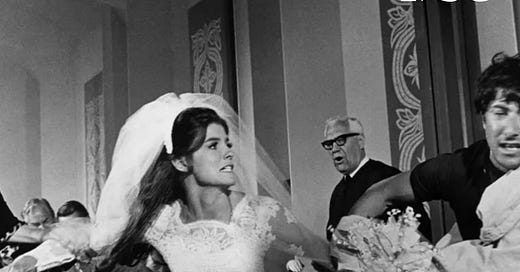
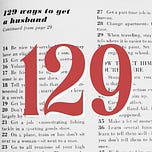



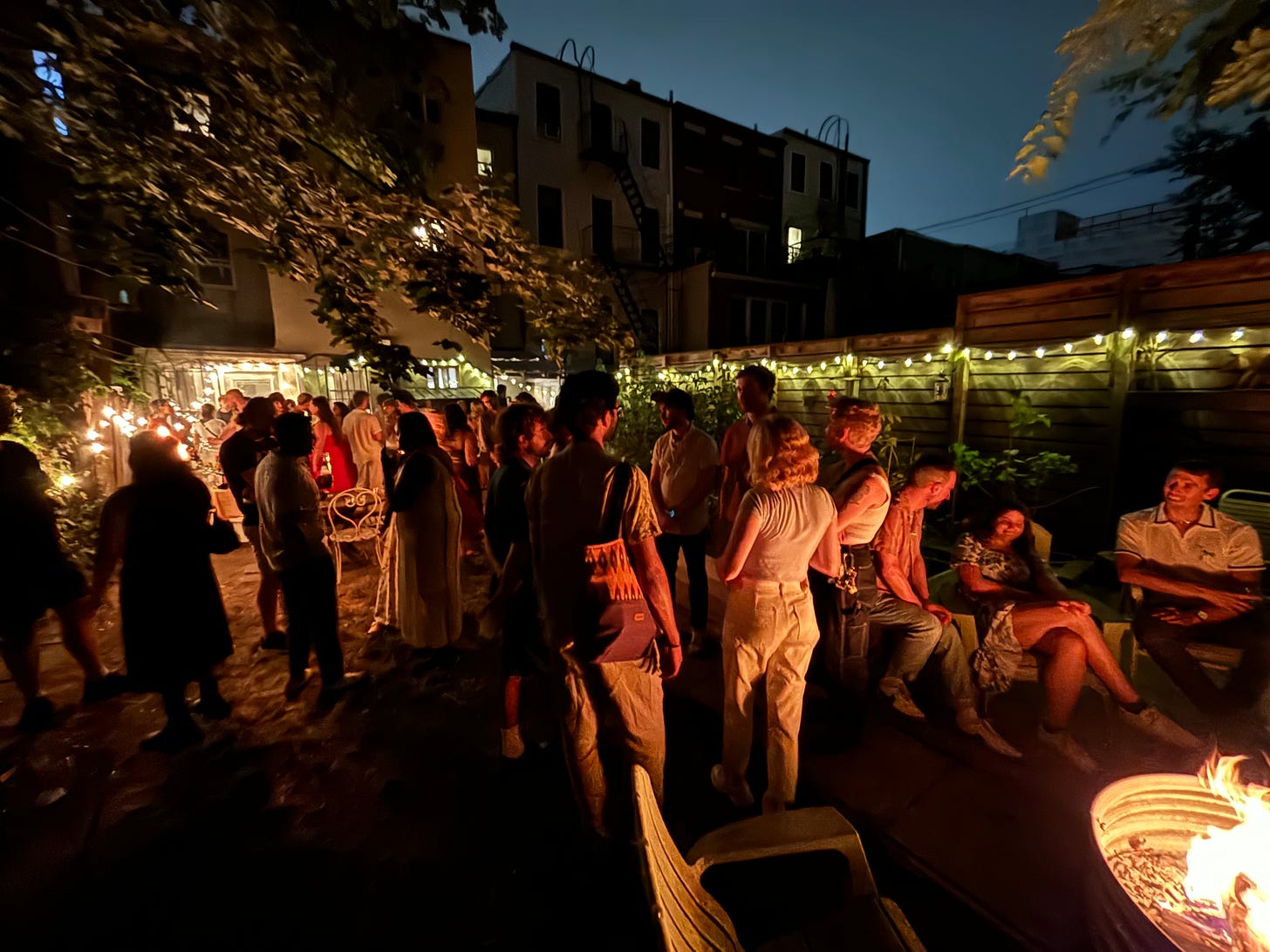

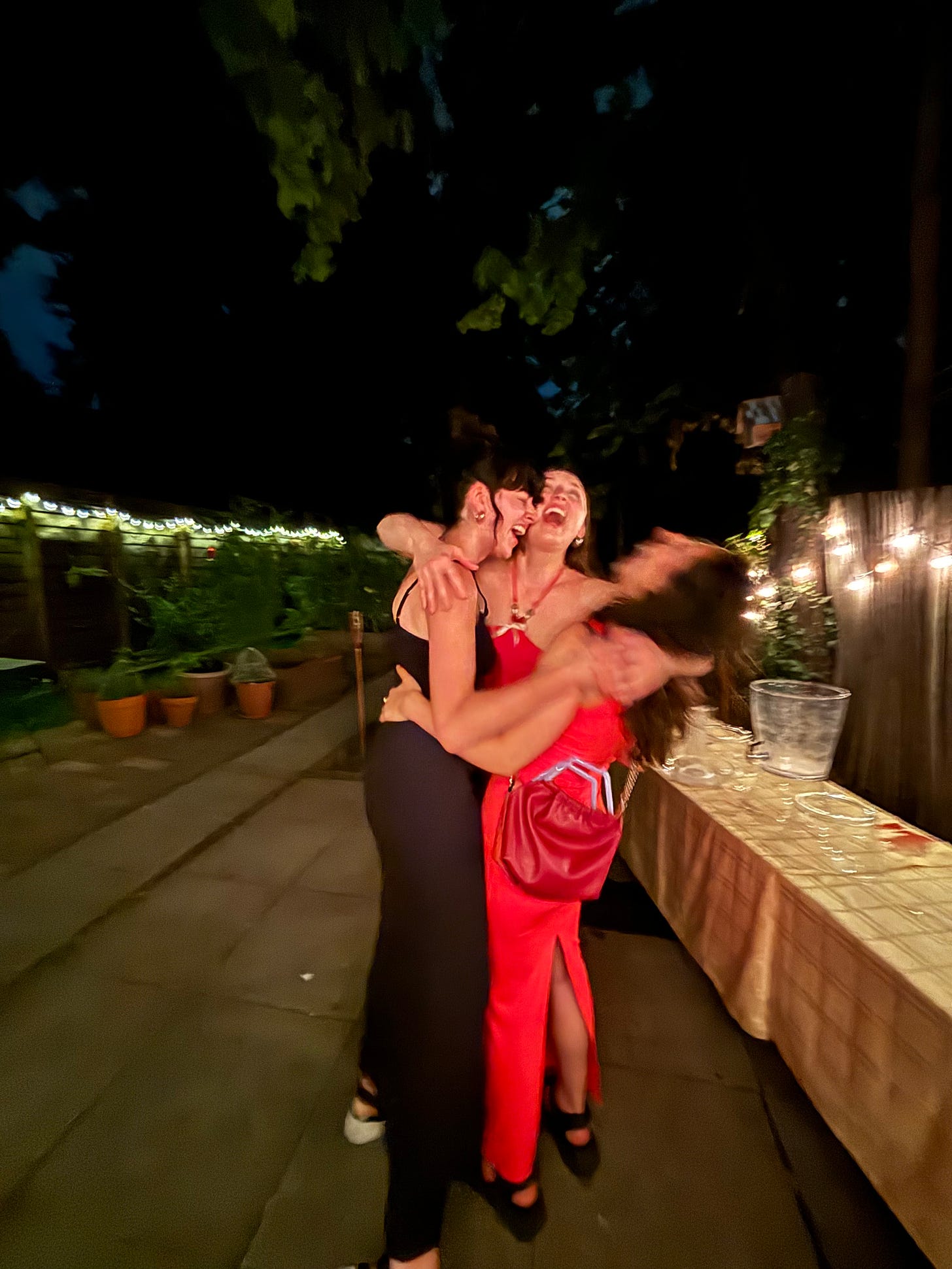


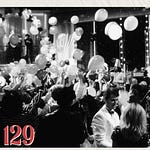
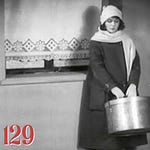
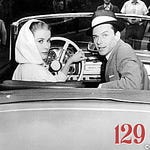
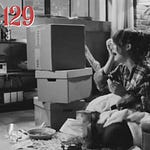
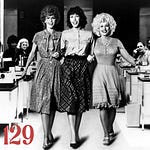
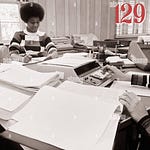
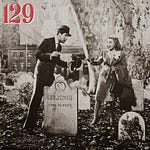
Share this post